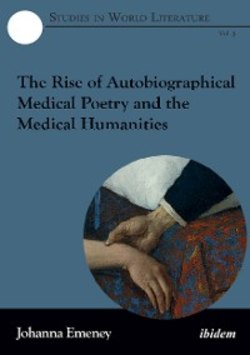Читать книгу The Rise of Autobiographical Medical Poetry and the Medical Humanities - Johanna Emeney - Страница 5
Introduction
The Modern Marriage of Medicine and Poetry
ОглавлениеOver the past 30 years, international symposia, prizes, publications and university programmes have come to accord the marriage of medicine and poetry our modern measures of approval: monetary value, media focus and academic recognition. Medical poetry has developed into a thriving literary sub-genre, with many contemporary poets publishing whole collections based on personal medical experience. The core concepts expressed by a good number of the individual poems and collections are shared by sociological research into illness and the doctor-patient relationship. These poetic texts are frequently taught in tertiary medical humanities courses, to complement pathography, autobiography and fiction.
Among the earliest countries to adopt the concept of the medical humanities, the United States and the United Kingdom, are at the forefront of symposia and conferences that combine lectures on medicine and poetry, highlighting their reciprocal relationship. The sheer number and magnitude of such events in the past two decades is evidence of the popularity and rigour of the field. For example, in 2004, Duke University’s inaugural poetry and medicine conference, Vital Lines: Vital Signs, welcomed 70 speakers from both medical and literary specialisms. Their May 2010 conference Life Lines: Poetry for Our Patients, Our Communities, Our Selves, featured talks and workshops combining the talents of leading American poets, creative writing teachers, oncologists and family doctors. In October of the same year, a symposium was held at the University of California, Berkeley, hosted by the Program for the Medical Humanities, to examine the use of narrative and metaphor in medicine. Some 8,000 kilometres away, in England, every May since 2010, the International Symposium on Poetry and Medicine has taken place at the University of Warwick, with themes such as the history of interactions between medicine and poetry, and the impact of health and disease on the writings of professional poets.
An international award with a £15,000 prize fund for poetry on medical subjects, The Hippocrates Poetry Prize, is also associated with the University of Warwick. This annual prize, first awarded in 2010, by nature of its monetary value and media coverage eclipses other prizes for medical poetry such as those sponsored by the Annals of Internal Medicine (since 1997) and Yale UCL (since 2011). Since its inception, The Hippocrates Prize has received thousands of entries from over 60 countries. The presence of such a prestigious and far-reaching award signals the growth of medical poetry as a significant global sub-genre, and one for which poets seek publication and recognition.
Well-known medical journals such as the Journal of the American Medical Association,1 the Medical Journal of Australia2 and The British Journal of Psychiatry,3 which were for many years publications solely dedicated to scholarly reviews and research-based articles, now publish poetry by physicians on a regular basis. Moreover, “new literary journals have sprung up at medical schools” (Thernstrom 2004, 44) and elsewhere: for example, the journal Medical Humanities, co-owned by the Institute of Medical Ethics (IME) and BMJ. There is also the extensive “Literature, Arts and Medicine Database” (established in 1994), maintained by the New York University School of Medicine, which is a rich online source of annotated poetry, prose, art and film for use in teaching in the medical humanities, and Oxford University’s TORCH website (established in 2013), offering early career scholars opportunities to embark on research projects or to attend workshops and conferences on humanities and mental health; humanities and science etc.
